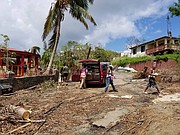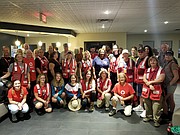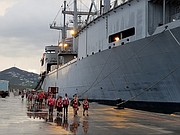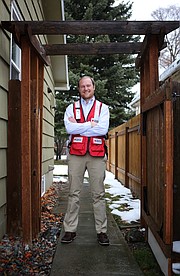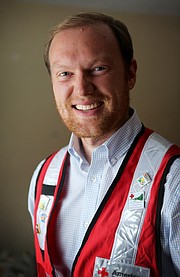Kalispell resident deploys for hurricane relief
Ted Koenig is more of a behind-the-scenes guy. In his work as a disaster program manager with the Red Cross, he puts his analytical mind to use, coordinating 150 volunteers throughout Northwest Montana to ensure the agency’s humanitarian mission is carried out year-round.
But when the Caribbean was pummeled by a series of hurricanes this summer, Koenig had a chance to join the boots-on-the-ground effort in the U.S. Virgin Islands.
“In the past, I’d been in a position to help people get out the door, now it was my turn to actually do something like that,” he said.
On Sept. 25, Koenig landed in Atlanta — the staging point for relief volunteers bound for both the Virgin Islands and Puerto Rico. Four days later, he arrived in St. Thomas — a formerly picturesque territory with a population of 51,000 — which was devastated by back-to-back Category 5 hurricanes Irma and Maria. The storms struck the island chain with winds up to 175 mph, virtually destroying the island’s power grid, homes and other resources.
When Koenig deployed, he was instructed to prepare for the unknown.
“They didn’t know where [staff and volunteers] were going to be staying. They were asking people to bring bug nets and a lot of bug spray, be willing to sleep on the floor, you’re going to be eating meals ready to eat,” Koenig said. “It was expected to be austere, so they wanted a certain type of volunteer or staff member to be down there, somebody who’d be able to weather that and still do the work on a day-to-day basis.”
Koenig, who’d spent three years in the Peace Corps stationed in rural Madagascar, fit the bill and offered himself up for the task.
Koenig was among the first wave of volunteers to relieve staff who had weathered the storms, and there was much work to be done. Although he was sent to the island as a planner, those first few days had Koenig delivering food and cleanup supplies to rural residents who either were unable to leave their homes or lived too far out to access a FEMA distribution center.
“We hopped in minivans, we tore all the seats out, we shoved as much materials in there as we could and went door to door,” he said.
Koenig enlisted the help of local volunteers who were able to guide the newcomers and provide cultural know-how. For example, it was perfectly acceptable to give a polite honk when making deliveries so folks would come outside, or to holler “hello inside!” to let residents know help had arrived.
“Being able to deliver those was a really heartwarming experience,” Koenig said of the food boxes, which contained canned goods, tortillas and other essentials.
One delivery in particular stands out.
They stopped at a gentleman’s home who expressed concern about a man who’d done work on his home. He told Koenig he hadn’t seen the man and wanted the Red Cross to make sure he was OK.
“He gets on a little scooter and he takes us down the ugliest, messiest roads .. there’s power poles and trees lying down in them,” Koenig recalled.
After 10 minutes navigating the treacherous roadway, they arrived to find the carpenter at his home and delivered a food box.
“I was really touched by that,” Koenig said of the man’s concern for his carpenter. “People really look out for each other.”
After four or five days distributing supplies, Koenig began the work of his original assignment at Red Cross headquarters. He helped supply information to higher-ups so they could make decisions about where and when resources were needed most, guiding the recovery efforts on the island. One of Keonig’s chief duties was to orchestrate information gathering about damage to residences. He sent out specially trained teams who compiled data on the extent of the damage so the agency could better distribute their time and resources.
When he wasn’t at work, Koenig resided on a retired Navy ship, the S.S. Wright. He was grateful for the accommodation, but noted he slept in tight quarters with “78 of my closest friends,” he said.
“They could have been EMTs from New Jersey, they could have been linemen from Wyoming there to restore the power grid, they could have been all-hands volunteers who were there to do muck-outs of the schools … they could have been Army Corps of Engineers staff members … it was just a really interesting mix of people,” Koenig said.
And everyone, he said, was working as hard as they could. But disaster relief on an island presented a unique set of challenges — namely transportation.
Stateside, Koenig is accustomed to requesting supplies and having them on-site in 24 hours, but that was not the case on St. Thomas. Items had to be placed in a container, then on a boat and sorted out once in port.
After two and a half weeks on the island, it was time for Koenig to return home. He described his departure as a “bittersweet” moment — he knew there was still much to be done in St. Thomas, but he had responsibilities at his work in Montana. He left inspired by the people he met on the island, and reassured that the team replacing him would continue doing what needed to be done.
“You’re dealing with so many dynamics, so many things that you wouldn’t expect,” he said. “I have a new appreciation for how difficult it is to do disaster recovery and response work effectively.”
To get involved with the Red Cross or to donate to hurricane relief efforts, visit www.redcross.org.
Reporter Mackenzie Reiss may be reached at 758-4433 or mreiss@dailyinterlake.com.









